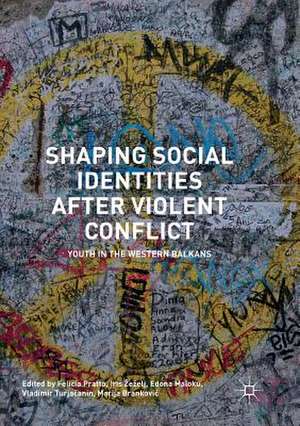Shaping Social Identities After Violent Conflict: Youth in the Western Balkans
Editat de Felicia Pratto, Iris Žeželj, Edona Maloku, Vladimir Turjačanin, Marija Brankovićen Limba Engleză Paperback – 4 iun 2019
| Toate formatele și edițiile | Preț | Express |
|---|---|---|
| Paperback (1) | 635.15 lei 6-8 săpt. | |
| Springer International Publishing – 4 iun 2019 | 635.15 lei 6-8 săpt. | |
| Hardback (1) | 643.84 lei 6-8 săpt. | |
| Springer International Publishing – 25 ian 2018 | 643.84 lei 6-8 săpt. |
Preț: 635.15 lei
Preț vechi: 747.23 lei
-15% Nou
Puncte Express: 953
Preț estimativ în valută:
121.55€ • 125.57$ • 101.16£
121.55€ • 125.57$ • 101.16£
Carte tipărită la comandă
Livrare economică 25 martie-08 aprilie
Preluare comenzi: 021 569.72.76
Specificații
ISBN-13: 9783319872155
ISBN-10: 331987215X
Pagini: 196
Ilustrații: XXV, 196 p. 12 illus., 9 illus. in color.
Dimensiuni: 148 x 210 mm
Greutate: 0.27 kg
Ediția:Softcover reprint of the original 1st ed. 2017
Editura: Springer International Publishing
Colecția Palgrave Macmillan
Locul publicării:Cham, Switzerland
ISBN-10: 331987215X
Pagini: 196
Ilustrații: XXV, 196 p. 12 illus., 9 illus. in color.
Dimensiuni: 148 x 210 mm
Greutate: 0.27 kg
Ediția:Softcover reprint of the original 1st ed. 2017
Editura: Springer International Publishing
Colecția Palgrave Macmillan
Locul publicării:Cham, Switzerland
Cuprins
Foreword; Boris Bizumic.- Preface; Iris Žeželj.- 1. Introduction; Felicia Pratto.- 2. Setting the Stage: Research on National, Ethnic, and Religious Identities After the Recent Violent Conflicts in the Western Balkans; Marija Branković, Vladimir Turjačanin, Edona Maloku.- 3. Methods Section: Quantitative and Qualitative Examination of Social Identities and Their Mutual Relations; Olja Jovanović, Marko Vladisavljević, Iris Žeželj, Marija Branković.- 4. Ethnic, Religious, and National Identities Among Young Bosniaks and Serbs in Minority and Majority Contexts in Bosnia and Herzegovina.- Vladimir Turjačanin, Srđan Dušanić, Siniša Lakić, Sabina Čehajić-Clancy, Maja Pulić de Sanctis.- 5. Is It Always Us or Them: How Do Young Serbs and Bosniaks Perceive Intergroup Borders?; Olja Jovanović, Maša Pavlović.- 6. Who Is This New We? Similarities and Differences of Ethnic, Religious, and National Identity Among the Albanian Majority and the Serb Minority in Post-Conflict Kosovo; Edona Maloku, Kaltrina Kelmendi, Marko Vladisavljević.- 7. Towards Inclusive Social Identities in the Republic of Macedonia; Ali Pajaziti, Biljana Blaževska-Stoilkovska, Ana Fritzhand, Agron Rustemi, Admir Qose.- 8. What Identities in the Present May Mean for the Future of the Western Balkans; Iris Žeželj, Felicia Pratto.- Index.
Notă biografică
Felicia Pratto is Professor of Psychology at the University of Connecticut, USA. Her research concerns social cognitive processes that contribute to group biases, intergroup relations, particularly power and the structuring of sexism and ethnocentrism, and international violence. She is co-creator of ‘Social Dominance Theory’.
Iris Žeželj is Assistant Professor of social Psychology at Belgrade University, Serbia. Her main areas of interest are social cognition, biases in memory, self-knowledge and group perception and inter-group relations. She has lead several international research projects on these topics.
Edona Maloku is Lecturer of Psychology at RIT Kosovo. Her research interests cover the national identity-building process in Kosovo’s new state and its effects on inter-ethnic relations after the conflict.
Vladimir Turjačanin is Associate Professor of Social Psychology at the University of Banja Luka, Bosnia and Herzegovina. His professional interests are in the area of ethnicity, ethnic relations, social identity, gender stereotypes and religious prejudice.
Marija Branković works in Faculty of Media and Communications at Singidunum University, Serbia. Her research focuses on psychological defences from the existential anxieties and their impact on social behaviour, self and social identifications, intergroup relations, persuasion and argumentation.
Iris Žeželj is Assistant Professor of social Psychology at Belgrade University, Serbia. Her main areas of interest are social cognition, biases in memory, self-knowledge and group perception and inter-group relations. She has lead several international research projects on these topics.
Edona Maloku is Lecturer of Psychology at RIT Kosovo. Her research interests cover the national identity-building process in Kosovo’s new state and its effects on inter-ethnic relations after the conflict.
Vladimir Turjačanin is Associate Professor of Social Psychology at the University of Banja Luka, Bosnia and Herzegovina. His professional interests are in the area of ethnicity, ethnic relations, social identity, gender stereotypes and religious prejudice.
Marija Branković works in Faculty of Media and Communications at Singidunum University, Serbia. Her research focuses on psychological defences from the existential anxieties and their impact on social behaviour, self and social identifications, intergroup relations, persuasion and argumentation.
Textul de pe ultima copertă
This book examines the identities of young adults in Bosnia-Herzegovina, Serbia, Kosovo, and Macedonia. With research drawn from a large multidisciplinary project exploring a potential for reconciliation in post-conflict societies, the authors discuss the interplay between ethnic, religious and national identities that have been the source of recent violent conflicts. They focus on people aged 18-30, representing generations that are socialized after the wars, but live in ethnically divided societies burdened with a difficult history. Another aim of the project was to compare majority and minority perspectives within each country, and to provide a unique view on how to reinterpret and build more inclusive social identities. Scholars and organizations interested in areas of social psychology, political science and sociology will find this research of great value.
Caracteristici
Focuses on several ethnic groups in four different countries in the Western Balkans Draws conclusions about the differences and similarities in identity processes across these regions Informs current debates about the psychological effects of majority/minority status
